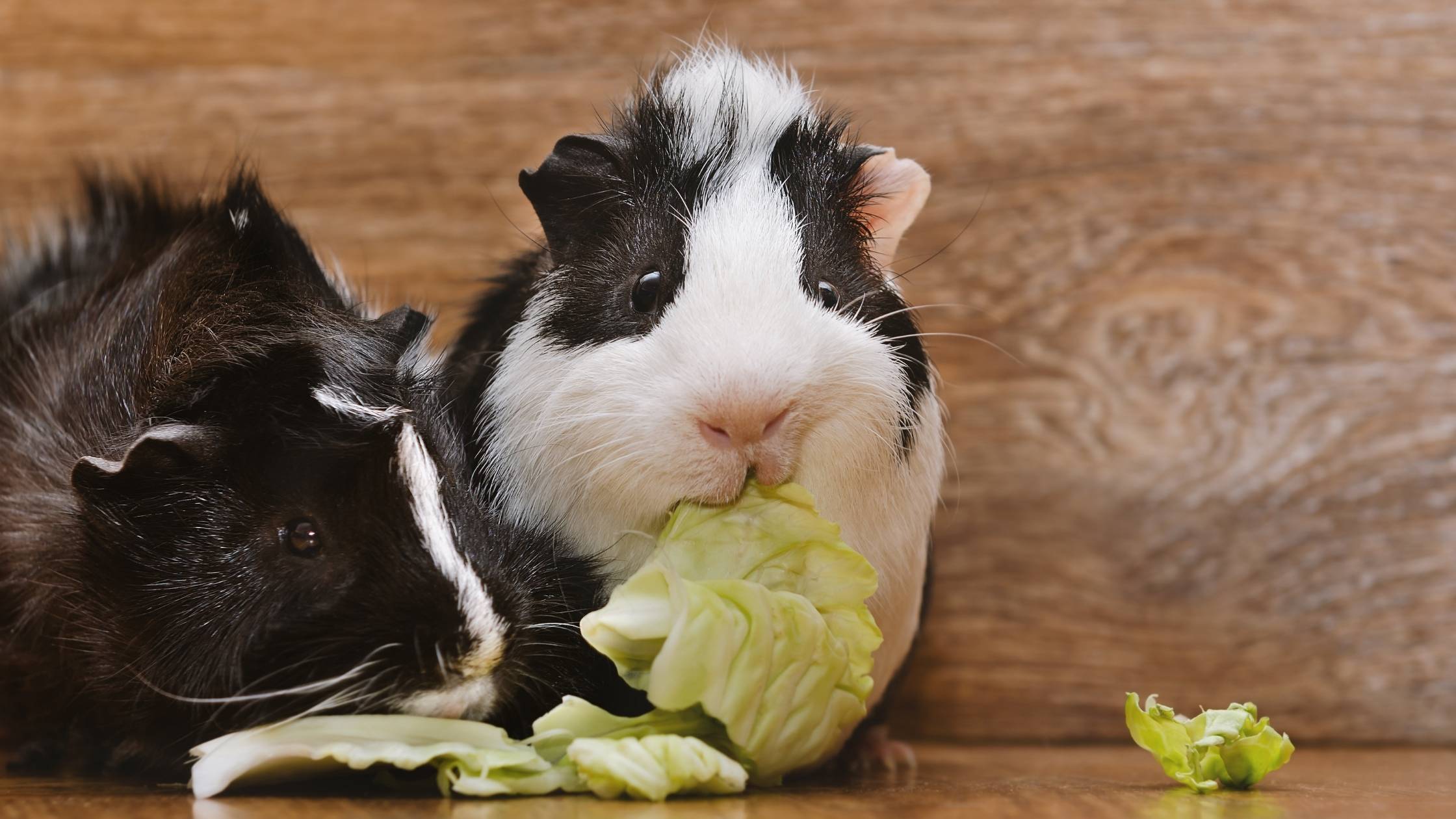Guinea pigs munch on pretty much anything fed to them. Whether it’s hay or some colorful toy, they’ll just start chomping right away. So, it’s crucial for pet owners to know the right foods to serve and what kind of nutrients these cavies should be getting.
For guinea pigs, meal plans are pretty straightforward. It doesn’t take much to fill their small stomachs, making food preparation a breeze even for beginners. But still, some owners wonder what kind of foods their cavy should get.
Can Guinea Pigs Eat Cabbage?
The simple answer to that is yes, guinea pigs can eat cabbage in moderation. These are packed with healthy amounts of vitamin C, vitamin A and vitamin K that these furry animals can benefit from. However, this veggie must be served not more than two meals per week to avoid health issues.
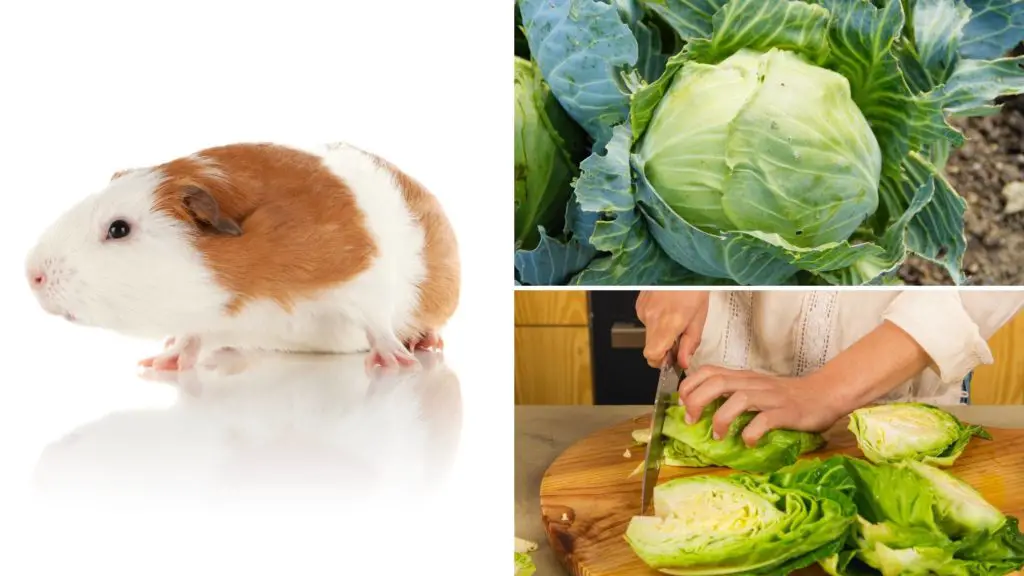
Why Cabbage is Good for Guinea Pigs
Just as veggies are great for people, cabbages contain a set of nutrients that would also do wonders for a guinea pig’s small body. Don’t be surprised though if they prefer the usual hay over these crunchy greens, as some cavies can be quite picky.
With that said, it’s essential for owners to know what kind of nutrients are in cabbages to better plan meals with this veggie.
Here are some nutrients worth noting:
Great Source of vitamin C
Common cabbage varieties contain a significant amount of vitamin C, which is an essential part of a guinea pig’s diet. Guinea pigs are highly prone to scurvy—vitamin C deficiency—because they are unable to produce their own.
Moreover, this vitamin is also a crucial factor for how guinea pigs can keep a strong immune system. These two reasons are easily why these greens should be a top choice for owners who want to feed their furry pigs enough vitamin C with only a few leaves in meals.
Rich in vitamin K
Low-maintenance as they are, guinea pigs are prone to injuries with their fragile legs and bodies. The legs of guinea pigs often get injured when they’re mishandled or dropped when carried.
Because of this, guinea pigs need sufficient amounts of vitamin K to ensure their injuries heal properly. vitamin K also helps out a lot with proper blood clotting that’s beneficial for guinea pigs that often get scratches or wounds on their tiny legs or body.
Abundant in vitamin A
According to the nutrient requirements of the guinea pig, vitamin A is one of the top nutrients guinea pigs need. It’s the vitamin that helps these little cavies maintain normal vision and a healthy immune system. It’s also the vitamin responsible for keeping kidney problems at bay.
As guinea pigs grow older, getting lots of vitamin A should become a top priority of its caretakers to ensure their pig grows up healthy and happy.
High in Fiber
Indigestion and bloating are two of the most health concerns in guinea pigs, emphasizing their need for fiber. Feeding them with cabbages helps avoid these problems in the long run, but again, just make sure to keep the serving size in check.
How to Serve Cabbage to Guinea Pigs
Preparing fresh cabbages for guinea pigs doesn’t have to be a masterchef routine. Just thoroughly wash the cabbage leaves before cutting them into bite-size pieces. Whether on a platter or just on the ground, guinea pigs will munch on them right away.
However, it’s crucial to plan on when you want to serve cabbages. Two cups of sliced cabbages a week will be more than enough for these furry little things.
Ideally, don’t serve them one meal after the other, as this may lead to bloating and indigestion. Likewise, once cabbages have been served, postpone serving spinach and broccoli for a while since these also have a bit of calcium.
Problems With Feeding Too Much Cabbage to Cavies
Cabbages don’t generally pose a threat to guinea pigs, unless they’re fed with too much of it. Remember that while cabbages are rich in nutrients good for cavies, each variety still contains notable amounts of calcium.
Compared to other mammals, guinea pigs are unable to regulate the calcium they take in. So, whatever calcium the cavy gets, the cavy retains—and this can be dangerous when too much is involved.
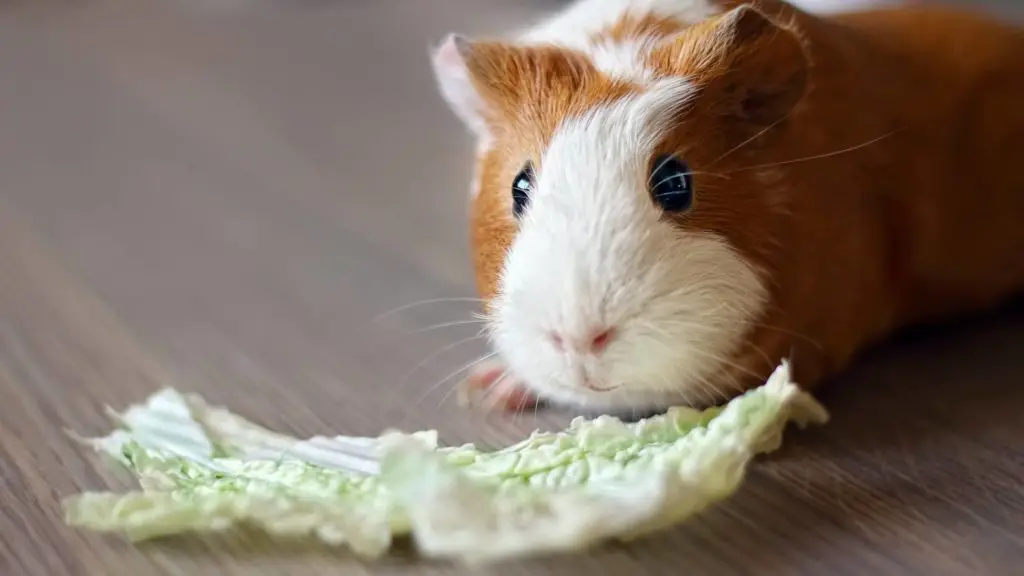
Having too much calcium in their system not only gives them indigestion and bloating, but potentially painful kidney and bladder stones as well. Unfortunately, once this gentle cavy suffers from these stones, they’re more likely to suffer from it again.
With all that said, a good habit to have would be to track the amount of cabbages—and calcium—they’re getting to avoid unwanted problems.
Apart from Cabbages, What Can Guinea Pigs Eat?
Cabbages shouldn’t be everything in a cavy’s meal plan. Guinea pigs need a lot of greens and veggies in their meals, and most of these staples can easily be bought at supermarkets and pet stores
Don’t worry, meal plans are generally fuss-free and easy to create. Here’s a list of what else to include in a guinea pig’s weekly meal plan:
Timothy Hay
The most essential part of a guinea pig’s diet is low-calcium hay. Timothy hay is rich in fiber, which promotes proper digestion in guinea pigs and lessens the risk of common digestive problems. Making hay available 24/7 also promotes constant chewing to wear down their ever-growing teeth.
Guinea Pig Pellets
Guinea pig pellets are often formulated with vitamin C and other essential nutrients to create a superfood. Serve ⅛ cup vitamin C-fortified pellets every day to easily incorporate lots of vitamin C into their meals.
Romaine Lettuce
Another fiber-rich veggie is romaine lettuce. A cup of romaine lettuce can be served about five to seven times a week. Iceberg lettuce, on the other hand, should be avoided at all costs as it doesn’t really have nutrients that pet pigs can benefit from.
Broccoli
Packed with vitamin C, broccoli is a great option for daily meals. It’s best served raw and chopped to be easily devoured by guinea pigs. However, since it also contains calcium, best not to serve it with cabbage on the same day.
Cilantro
This famous herb used to flavor many human dishes is also a delight for guinea pigs. According to vets, cilantro is packed with antioxidants and vitamin C, all of which are crucial for cavies. Just keep in mind to serve 1 to 2 bites-sized pieces once or twice a week.
Kale
It’s now becoming more apparent that dark, leafy greens are top choices for daily meals—with Kale being a top pick. It’s a superfood not just for humans, but also for cavies. It’s full of vitamins A, C and K with all the beneficial fiber. Just don’t feed it more than three times a week.
Tomatoes
Can guinea pigs eat tomatoes? The simple answer is yes! Small, ripe tomatoes are great for guinea pigs as these are rich in fibre, vitamin C, vitamin K and vitamin B. Serve bite-sized tomatoes, or better yet cherry tomatoes, two to three times a week.
Carrots
Rabbits shouldn’t be the only animals enjoying carrots. As a famous source of vitamin A, all parts of a carrot are safe and nutritious for guinea pigs. Simply chop up one medium-sized carrot or serve baby carrots at most twice a week, with a couple of days in between.
Poisonous Foods to Guinea Pigs
As cavies, guinea pigs tend to chew on anything in sight. This only shows why it’s important to pay attention to what goes into their mouths and what lies around in their cages. By knowing which foods are poisonous to these gentle pigs, pet owners can avoid fatal problems.
The list below shows what should definitely be excluded in meals:
Meat
Can guinea pigs eat meat? Absolutely not. By all means, meat should not be fed to guinea pigs as they are herbivores. Ingesting any kind of meat can cause severe stomach problems and, in severe cases, even death.
Biscuits and Crackers
A guinea pig’s digestive system is unable to process foods like crackers and biscuits because these contain a lot of salt, oil and flour. Some crackers are also made with sugar, which promotes the growth of bad bacteria in the digestive tracts of guinea pigs that can cause problems.
Chocolate
As mentioned, sugar is pretty bad for these cavies. It causes problems in their digestive systems because they simply cannot process sugars well. On top of that, chocolate also contains caffeine that speeds up their heartbeats which can kill guinea pigs.
Peanut Butter
It may be a treat for humans, but the same cannot be said for guinea pigs. Peanut butter spreads are rich in salt and fat that their tiny digestive systems cannot handle—leading to indigestion and diarrhea. It’s also a choking hazard as some peanut butters are formulated to be chewy.
Bulb Vegetables
Owners also wonder, can guinea pigs eat onions? Guinea pig owners should know that their pets should never eat anything from a bulb—that means onion, garlic and potatoes. This is because bulb vegetables contain disulfide and thiosulphate which are toxic for guinea pigs.
Dairy Products
Cavies are lactose intolerant. Apart from that, milk also comes from animals which cannot be ingested by cavies—everything from animals is generally bad for them. Even small amounts of any dairy product can blow up to severe indigestion.
Frequently Asked Questions
Can cabbage kill guinea pigs?
No, cabbage cannot directly kill guinea pigs if fed in moderation. However, feeding too much cabbage may cause indigestion, bloating and diarrhea. In severe cases of diarrhea, guinea pigs may suffer from dehydration that may cause death.
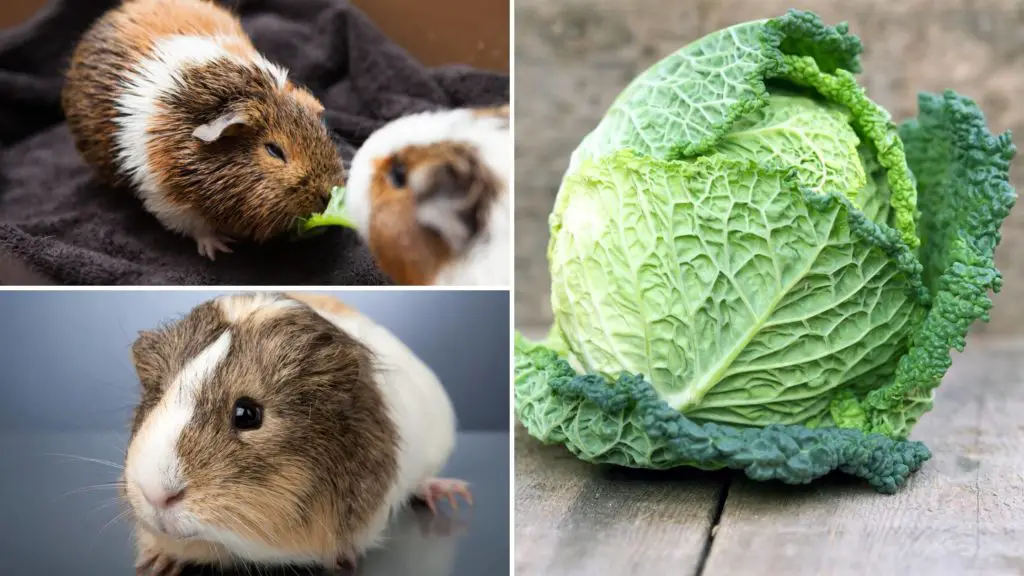
Why can’t guinea pigs have cabbage excessively?
Cabbage contains calcium which commonly causes indigestion, bloating, diarrhea and bladder stones in guinea pigs. All these health concerns cause discomfort to guinea pigs which is why it should be kept in moderation.
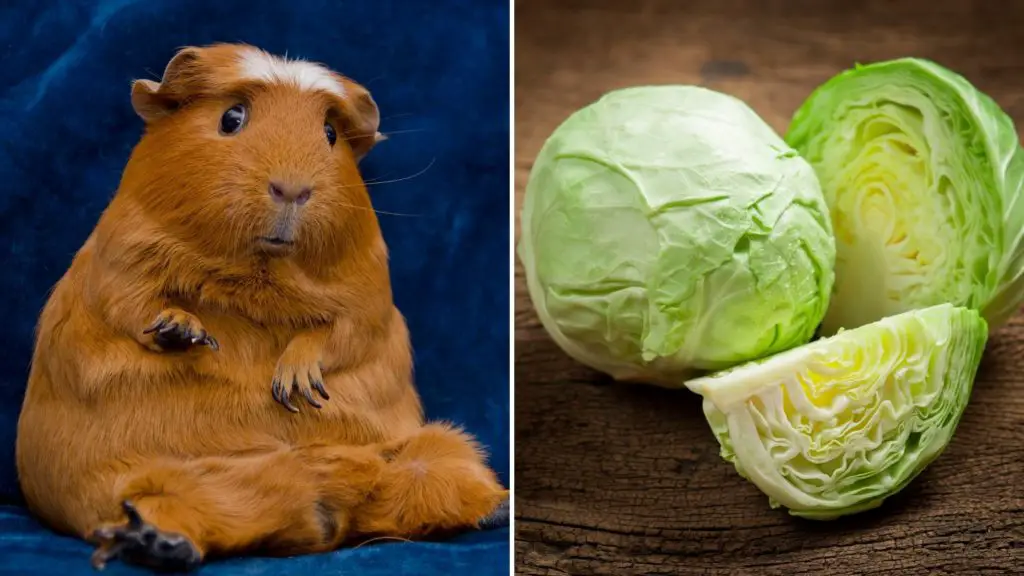
Can guinea pigs eat green cabbage?
While people often mistake green cabbages for white ones, these two varieties are quite distinct from each other—especially when it comes to guinea pig diets.
Yes, they can eat green cabbage, but only in moderation. Green cabbages are high in vitamin C which is necessary for a guinea pig’s diet. However, since it also contains calcium, feeding it excessively to these cavies might cause bladder and kidney stones.
Can guinea pigs eat white cabbage?
With the amount of fiber and vitamin C, white cabbages can be eaten by guinea pigs. It’s also good to note that white cabbages are low in calcium which lessens the risk of kidney stones and other bladder problems.
Can guinea pigs eat savoy cabbage?
Absolutely. Guinea pigs will love the crunch and texture of savoy cabbages, making it a delight to eat. This variety is rich in vitamin A and vitamin C, but low in calcium, which can be a great addition to meals, especially if the guinea pig is unfortunately suffering from UTI.
Can guinea pigs eat red cabbage?
Certainly, guinea pigs can eat red cabbages. In fact, among all the varieties, this one contains the highest amount of vitamin C, vitamin K and vitamin A. Ideally, it’s the variety that pet owners often feed their guinea pigs.
Sadly, this variety also contains a significant amount of calcium that must be kept in moderation to avoid kidney and bladder problems.
Key Takeaways
So, can guinea pigs eat cabbage? Absolutely! Just limit to two cups of this sliced veggie each week, and take note of the variety of cabbages and the serving size so that no problems arise from excessive consumption.
With the complete list of foods good and bad for guinea pigs, preparing a meal plan should be fuss-free! Read more about how guinea pigs can be better taken care of here.
References:
- SELF Nutrition Data, ‘Cabbage, raw’, https://nutritiondata.self.com/facts/vegetables-and-vegetable-products/2371/2, Accessed – 18 May 2021
- Sawnee Animal Clinic, ‘Vitamin C Deficiency (“Scurvy”) in Guinea Pigs’, https://sawneeanimalclinic.com/downloads/vitamin_c_deficiency_scurvy_in_guinea_pigs.pdf, Accessed – 18 May 2021
- NCBI, ‘Nutrient Requirements of the Guinea Pig’, https://www.ncbi.nlm.nih.gov/books/NBK231932/, Accessed – 18 May 2021
- CV Laval, ‘Nutrition for Guinea Pig’, https://cvlaval.com/en/exotic-services/fact-sheet/nutrition-guinea-pig.html, Accessed – 18 May 2021

